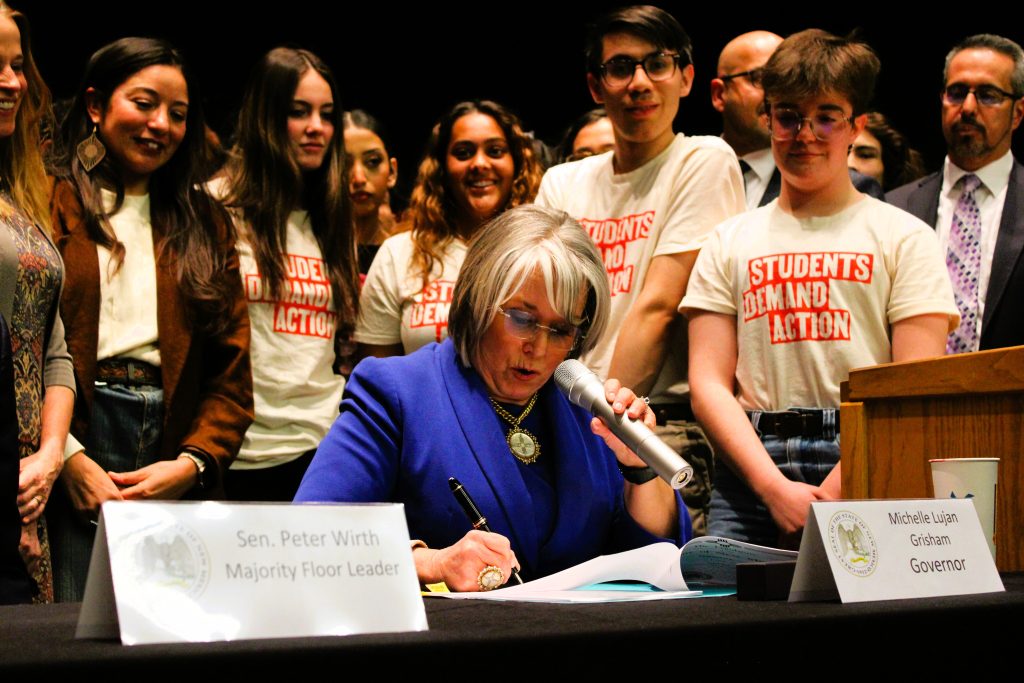Tamara Kay is an associate professor of sociology at the University of New Mexico. Gordon Lafer is an associate professor at the University of Oregon.
Despite being dealt a death blow in the state Senate at the final hour during the last legislative session, proponents of right-to-work laws are at it again. What was most alarming about last year’s debate was how lobbyists manipulated facts to propel their pet bills through the legislature. The head of the Rio Grande Foundation (RGF), Paul Gessing, promoted bogus research reports to legislators and the public that no credible statistician or social scientist would ever put their name on, suggesting that right-to-work laws increase economic growth, jobs and personal income.
To correct these errors, we carefully explained the gaping flaws in RGF’s so-called “research.” The Foundation’s numbers are based on two fundamental statistical errors. First, they do not control for or “hold equal” the multitude of factors that contribute to economic growth – meaning they treat all economic growth in a state as if it’s the result of “right to work.” Secondly, the Rio Grande Foundation repeatedly makes misleading or meaningless predictions based on the “kindergarten math” of simple averages.
Making predictive arguments using simple averages of other states’ growth rates makes no sense statistically. It’s comparable to the argument that because people with larger shoe sizes are more likely to have heart attacks, big shoes must cause heart attacks. In truth, there are other variables at work – such as the fact that children (who have small shoes) are much less likely to have heart attacks. Right-to-work proponents have used bogus “research” reports that control for few, if any, variables to argue that right-to-work states have better economic growth, and then declare that New Mexico would similarly benefit by passing this bill.
The RGF claims that right-to-work laws would attract more jobs to New Mexico, a claim which has no basis in scientific evidence, in any state. There is an entire field of research in economics, management, and organizational sociology dedicated to analyzing the location decisions of U.S. and foreign corporations. This research shows that among the most important variables are: market size, local taxes, wage rates and transportation infrastructure – but not right-to-work laws.
The Rio Grande Foundation lobbyists ignore this scientific research because it disproves their claims. Instead, they quote a few carefully selected site selection consultants whose opinion agrees with RGF – but who offer no statistical data of their own. The RGF then pretends that these anecdotes somehow represent economic truth. In reality, there are plenty of consultants who say the opposite. For instance, in 2014 one site location expert – based in North Carolina – explained to the Albuquerque Business Journal that “….Since [the 1980s], right-to-work has steadily become less and less important as a location factor for most companies to the point now that it hasn’t come up on my projects in probably ten years…” It’s a big world, and if you look hard you can find people with opinions on every side of every issue. But lawmakers should make decisions based on economic fact, not personal opinions.
This year, the RGF has sunk to new lows, publishing “reports” that appear intentionally designed to confuse the public. In a recent report it notes that jobs in fair-share states have “higher wages and benefits,” and the main attraction of right-to-work laws for employers is the draw of lower wages. But, New Mexico already has among the lowest wages in the country. If low wages were enough to make companies move to New Mexico, it would have happened already.
The larger problem with the right-to-work proponents’ assertions is that they begin with an ideological conclusion that the power of unions needs to be undermined in the U.S. and then look for facts to fit that conclusion.
A study by Bruce Western at Harvard and Jake Rosenfeld at the University of Washington estimates that the decline of unions may account for one-third of the rise of inequality among men, and one-fifth among women. Their conclusion is important for policy makers considering right-to-work, because they show that unions have helped to improve nonunion workers’ wages as well: “The analysis suggests that unions helped shape the allocation of wages not just for their members, but across the labor market…The social experience of organized labor bled into nonunion sectors, contributing to greater equality overall.”
Improving wages and reducing inequality across the U.S. depends on the existence of strong unions. The best scientific research we have shows that right-to-work lowers wages and benefits, for all working people. New Mexico legislators should be focusing on proven strategies for success like creating a solid infrastructure for our state, equipping schools and teachers with resources, and seeking out emerging and innovative industries that offer better and more permanent jobs. In a 30 day session, there is no time to chase after policies that do not work, like right-to-work.
Dr. Tamara Kay began her academic career at Harvard where she was Associate Professor of Sociology and Co-Director of Harvard’s Transnational Studies Initiative. She received her Ph.D. from the University of California, Berkeley in December 2004 and spent two years as a Post-Doctoral Fellow at the Center for U.S.-Mexican Studies at the University of California, San Diego. Her work centers on the political and legal implications of regional economic integration, transnationalism, and global governance. Dr. Kay is currently an associate professor of sociology at the University of New Mexico.
Dr. Gordon Lafer is an Associate Professor at the University of Oregon. He joined the Labor Education and Resource Center faculty in 1997. His work concentrates on strategic planning, strategic research, and labor andemployment policy issues. From 2009 through 2010, Lafer served as Senior Labor Policy Advisor for the U.S. House of Representatives’ Committee on Education and Labor.























